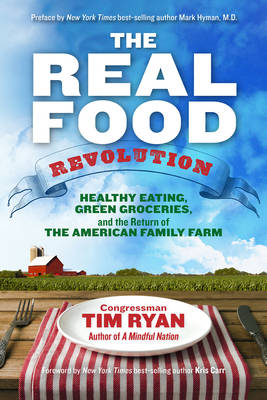
- Afhalen na 1 uur in een winkel met voorraad
- Gratis thuislevering in België vanaf € 30
- Ruim aanbod met 7 miljoen producten
- Afhalen na 1 uur in een winkel met voorraad
- Gratis thuislevering in België vanaf € 30
- Ruim aanbod met 7 miljoen producten
Zoeken
The Real Food Revolution
Healthy Eating, Green Groceries, and the Return of the American Family Farm
Tim Ryan
Paperback | Engels
€ 26,95
+ 53 punten
Omschrijving
We Americans love our food. It's part of what has made this nation great. Our fertile farmlands and the abundance and variety of our agricultural output are the envy of the world. For most of our history, we lived close to the land, food was accessed locally, and we processed it in our own kitchens. But as our population and economy has boomed in the last century and we concentrated in cities, we industrialized our food system--with food coming far from home and processed multiple times. As foods rich in natural taste declined, we relied on high amounts of added sugar, fat, and salt to entice our palates. And it has taken a toll: our soil is polluted, our practices are unsustainable, and our health problems, including everything from allergy-related disease to obesity, are on the rise. This has all contributed to historic levels of heart disease, stroke, diabetes, and other causes of preventable death. The good news is that people are starting to find solutions. They're voting with their pocketbooks for a new kind of food system--family farm, 21st-century style. Suburban and urban moms (and dads) want to know what's in their food and where it comes from. No more snack packs, Ding Dongs, and soda for lunch. This revolution is not only in how people eat, but also in how they grow, distribute, shop for, and prepare food. And the food is better tasting, better looking, and better for you.The Real Food Revolution by Congressman Tim Ryan is a manifesto for this new food movement. In it, readers will find information on: - The history and current state of our food systems - Myriad negative impacts of our present food practices on our health and our planet - Pros and cons of the current farm bill and what changes could help restore our nation - What's happening both at the national and local levels - How people can get involved, with actionable steps at the end of each chapter This is a non-partisan, good-news message that will inform, inspire, and help readers around the country get involved. The era of the Twinkie and the hot-dog-stuffed-crust pizza has been fun, but now it's time for a change.
Specificaties
Betrokkenen
- Auteur(s):
- Uitgeverij:
Inhoud
- Aantal bladzijden:
- 240
- Taal:
- Engels
Eigenschappen
- Productcode (EAN):
- 9781401946401
- Verschijningsdatum:
- 13/10/2015
- Uitvoering:
- Paperback
- Formaat:
- Trade paperback (VS)
- Afmetingen:
- 132 mm x 208 mm
- Gewicht:
- 272 g

Alleen bij Standaard Boekhandel
+ 53 punten op je klantenkaart van Standaard Boekhandel
Beoordelingen
We publiceren alleen reviews die voldoen aan de voorwaarden voor reviews. Bekijk onze voorwaarden voor reviews.











